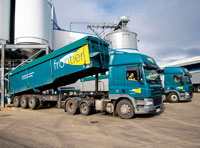Frontier grows profits despite difficult climate

Frontier Agriculture, Britain’s biggest grain trader and farm inputs business, has reported an operating profit of £21.4m for the year ending June 2009.
Profits after tax were fractionally up on the year, despite the collapse in grain prices and turmoil caused by the global financial crisis. Turnover grew 12% to £1.15bn.
But the biggest change was the vast reduction in finance costs, caused by the fall in grain values. This meant less working capital was required to underpin the company’s activities and grain stocks, and the annual interest and finance bill fell from £6.6m to £2.6m.
Its crop inputs distribution business grew 25% year on year.
Chairman David Yiend said that during the period covered by these accounts, grain prices fell by 50% while fertiliser prices peaked and then halved again. “The challenging environment required an exceptional response from Frontier whose strong balance sheet, unique crop trading structure and integrated agronomy and inputs business meant it was well equipped to manage both the risk and the opportunity.”
Frontier, which is jointly owned by Associated British Foods and Cargill, was created in 2005 with the merger of Banks Cargill Agriculture and Allied Grain.
In January 2009 Frontier acquired Scottish agronomy firm Lothian Crop Specialists, and added precision farming business SOYL to the company portfolio in April last year.
Managing director Mark Aitchison said: “The market volatility in grains was replaced by volatility in fertiliser and crop inputs. In the last two years we’ve continued to build the company to perform well and these results show our model and approach to managing risk has proved capable of resisting the volatility.
“We’re the only grain business that runs one national grain book, and we’ve invested heavily – £3.5m in four years – in systems to help us manage risk centrally.”
The bottom-line profit of £21.4m – compared with £21.1m in 2008 – was 50% higher than budget, he said.
Neither of Frontier’s shareholder firms will take any dividend. All profits have been retained in the business since it began – a figure now approaching £100m, Mr Aitchison said. Frontier was on course to deliver profits of £22-£23m in its next financial year, he added. This programme of continual investment in infrastructure had seen £400,000 committed to a new grain drying site in Aberdeenshire, with £350,000 invested in a new seed cleaning plant in East Anglia this year.
Agronomy and precision farming were key growth areas for Frontier’s future, said Mr Aitchison. “I see us growing our crop protection business further through acquisition. In the future farmers will need to use crop inputs more judiciously to optimise gross margins and it’s likely they will need to demonstrate accurate use to comply with agri-environmental rules.”
Frontier currently supplies about 35% of the grain it trades into its parent business, like Cargill’s Manchester starch plant, with the balance traded into the mainstream cereals industry.
